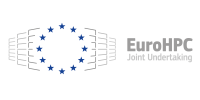Annotation
This hands-on workshop organized under the umbrella of the IO-SEA project will introduce Phobos, object storage on tapes.
Benefits for the attendees, what will you learn
Attendees will be introduced to storage architectures for HPC. The event focuses on Phobos, an object storage software used within the IO-SEA project, and will enable the attendees to:
- Know more about storage architectures for HPC
- Know more about object storage
- Know more about storage technology specificities
- Understand Phobos, open-source software to efficiently manage objects on tapes
- Learn how to set up and use Phobos in a VM environment
- Practice exercises on Phobos: storing, retrieving, and manipulating data
Level
intermediate
Language
English
Prerequisites
Experience with UNIX systems and shell, basic knowledge of storage systems.
Tutors
Guillaume Courrier has been a developer at CEA for 2 years, working on Phobos and Robinhood. He also contributes to Lustre development.
Sebastien Gougeaud works at CEA for 3 years in the HPC division. He is currently a software developer, working on RobinHood and Phobos. He also leads the research of a team of data scientists to use machine learning algorithms to better understand and manage computation clusters.
Acknowledgments


This work was supported by the IO-SEA project. This project has received funding from the European High-Performance Computing Joint Undertaking (JU) under grant agreement No 955811. The JU receives support from the European Union’s Horizon 2020 research and innovation programme and France, Germany, the United Kingdom, Ireland, the Czech Republic, Sweden. This project has received funding from the Ministry of Education, Youth and Sports of the Czech Republic (ID: MC2105).
